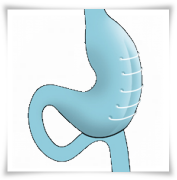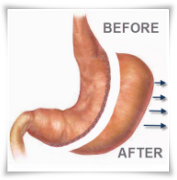Gastric Sleeve Candidates
The gastric sleeve procedure is a solution for individuals that suffer from obesity, and gastric sleeve candidates should be patients who are aged between 18 to 60 years old, and have a BMI (Body Mass Index) between 35 and 40.
Gastric sleeve candidates can also be individuals where a duodenal switch or a gastric bypass procedure may pose too high a risk due to their weight.
Gastric sleeve candidates who are outside of the age limit may be scrutinized by the hospital’s leading gastroenterologist who must sign a consent form for that person to undergo surgery.
The examination is to ensure that the conditions will be safe for the gastric sleeve candidates to undergo procedure, and that the patients are not put at unnecessary risk.
Click here to read more information about the Gastric Sleeve.
Gastric Sleeve Candidates – General Requirements
Below is a general outline of the requirements that gastric sleeve candidates must meet in order to qualify for this procedure:
- BMI (Body Mass Index) of 35 or greater
- BMI between 30 to 40 and when suffering from health conditions like the high blood pressure, diabetes, arthritis (joint pains), and sleep apnea among others
- Over the age of 14
- No drugs or alcohol reliance
- Do not qualify for other more invasive procedures
- Patients who will undergo a secondary procedure
- Patients will not qualify for other procedures until they are at a safe weight
In a lot of cases, those patients that have an excessive BMI of more than 60, will be potential gastric sleeve candidates. As a preliminary procedure, the patient will have to achieve a weight that will allow them to undergo the secondary procedure, which is usually the duodenal switch or gastric bypass procedure. These two surgeries will put a higher amount of stress on the body, hence a higher risk, especially for gastric sleeve candidates that are extremely obese.
These more invasive surgeries if performed at their current extreme weight can lead to serious complications, or even death. The gastric sleeve surgery will help these individuals come down to a more manageable weight, which will make the duodenal switch of gastric bypass procedure much less risky, with better weight loss results.
Other factors that should be considered for the gastric sleeve candidates may consist of:
- Failed Attempts:History of failed attempts to lose weight using the self taught diet or drug supported procedures for at least 12 months.
- Obese for 5 Years:An individual who has been obese for 5 consecutive years or more can qualify.
- No Other Conditions:No Hiatus Hernia or any other gastric problems that may put the patient at risk.
- Excessive Scar Tissue: This may make it difficult for the body to heal properly following surgery.
Gastric Sleeve Candidates – Be Prepared For Change
Gastric sleeve candidates must be ready to accept the major long term changes to their lifestyle necessary to achieve the weight loss. This will include changes to the quantity of food per meal, frequency of meals, types of foods allowed, eating habits, and exercise routines. The patient should also maintain close contact with their surgical team for the months following the surgery to provide them with the responses, answers, advice, and to monitor the overall health of the patient.
Good gastric sleeve candidates possess an open attitude to be motivated to transform one’s life. It is also important to have a positive manner and to accept the rules of the weight loss team to achieve success.
Gastric sleeve surgery can help overweight individuals to curb their appetite for food. Thus; they will be able to limit the amount of food that will be ingested at any given time. Like all the surgical weight loss procedures, losing excess weight will solely depend on the ability to adhere to a lifestyle modification, healthy diet, and regular exercise. The weight loss surgery itself does not entail a lot of food restrictions as the stomach will continue to function normally, but in the case of the weight loss, those high calorie drinks and high cholesterol foods should be strictly avoided.
Gastric sleeve candidates must be ready to make a lifestyle change in order for the treatment to be successful. The surgery itself is not the solution, there dietary changes that gastric sleeve candidates must embrace. Also, eating habits need to be significantly modified, and the initial diet will be restricted to liquids to allow the stomach to heal. It is very important that gastric sleeve candidates are committed to this lifestyle change to ensure a successful weight loss.
Many bariatric surgeons will recommend that the patient eat 5 small healthy meals per day with no snacking in between meals. Once the ideal weight has been reached, a calorie count of 1,000 to 1,200 per day can be tolerated by most gastric sleeve candidates.


